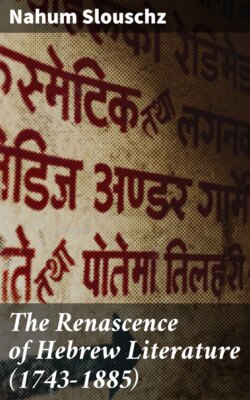The Renascence of Hebrew Literature (1743-1885)

Реклама. ООО «ЛитРес», ИНН: 7719571260.
Оглавление
Nahum Slouschz. The Renascence of Hebrew Literature (1743-1885)
The Renascence of Hebrew Literature (1743-1885)
Table of Contents
INTRODUCTION. CHAPTER I In Italy—Moses Hayyim Luzzatto. CHAPTER II In Germany—The Meassefim. CHAPTER III In Poland and Austria—The Galician School. CHAPTER IV In Lithuania—Humanism in Russia. CHAPTER V The Romantic Movement—Abraham Mapu. CHAPTER VI The Emancipation Movement—The Realists. CHAPTER VII The Conflict with Rabbinism—Judah Leon Gordon. CHAPTER VIII Reformers and Conservatives—The Two Extremes. CHAPTER IX The National Progressive Movement—Perez Smolenskin. CHAPTER X The Contributors to Ha-Shahar. CHAPTER XI The Novels of Smolenskin. CHAPTER XII Contemporaneous Literature. CONCLUSION. INDEX
INTRODUCTION
CHAPTER I. IN ITALY. MOSES HAYYIM LUZZATTO
CHAPTER II. IN GERMANY. THE MEASSEFIM
CHAPTER III. IN POLAND AND AUSTRIA. THE GALICIAN SCHOOL
CHAPTER IV. IN LITHUANIA. HUMANISM IN RUSSIA
CHAPTER V. THE ROMANTIC MOVEMENT. ABRAHAM MAPU
CHAPTER VI. THE EMANCIPATION MOVEMENT. THE REALISTS
CHAPTER VII. THE CONFLICT WITH RABBINISM. JUDAH LEON GORDON
CHAPTER VIII. REFORMERS AND CONSERVATIVES. THE TWO EXTREMES
CHAPTER IX. THE NATIONAL PROGRESSIVE MOVEMENT. PEREZ SMOLENSKIN
CHAPTER X. THE CONTRIBUTORS TO HA-SHAHAR
CHAPTER XI. THE NOVELS OF SMOLENSKIN
CHAPTER XII. CONTEMPORANEOUS LITERATURE
CONCLUSION
Отрывок из книги
Nahum Slouschz
Published by Good Press, 2019
.....
Naphtali Hartwig Wessely (born at Hamburg in 1725; died there in 1805) is considered the prince of the poets of the time. Belonging to a rather intelligent family in easy circumstances, he received a modern education. Though his mind was open to all the new influences, he nevertheless remained a loyal adherent of his faith, and occupied strictly religious ground until the end. He devoted himself with success to the cultivation of poetry, and completed the work of reform begun by the Italian Luzzatto, to whom, however, he was inferior in depth and originality.
Wessely's poetic masterpiece was Shire Tiferet ("Songs of Glory"), or the Epic of Moses (Berlin, 1789), in five volumes. This poem of the Exodus is on the model of the pseudo-classic productions of the Germany of his day; the influence of Klopstock's Messias, for instance, is striking.
.....